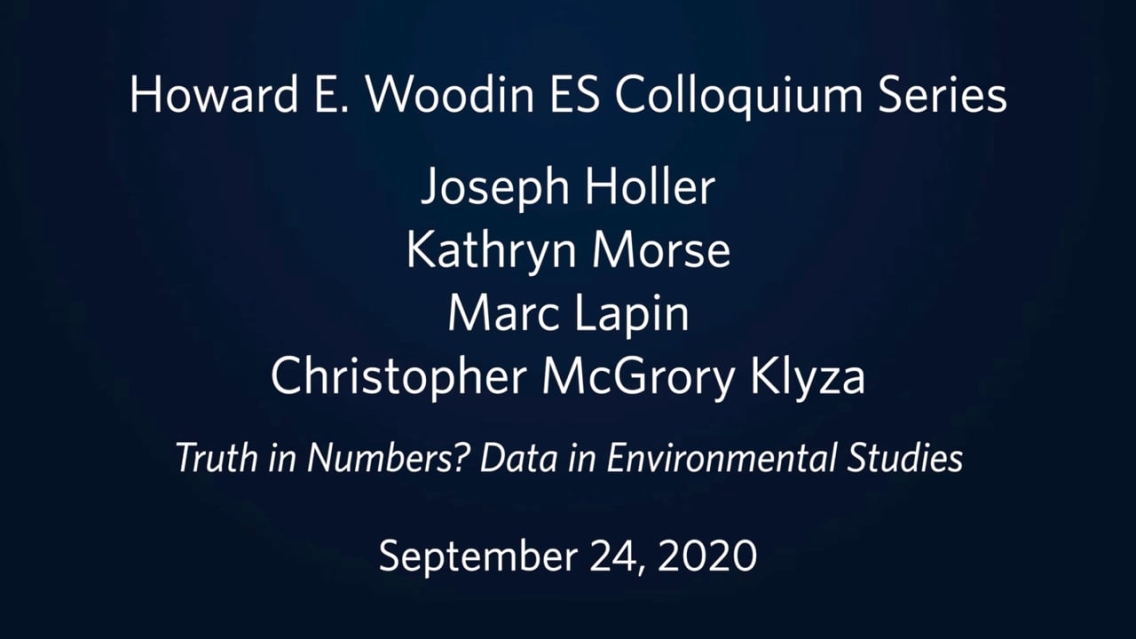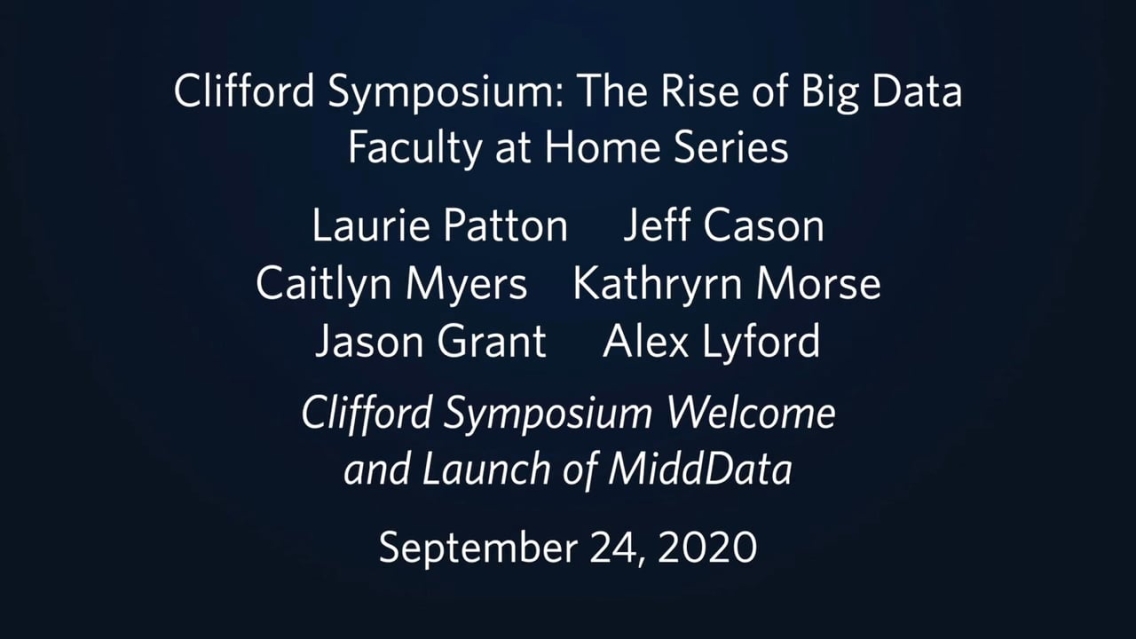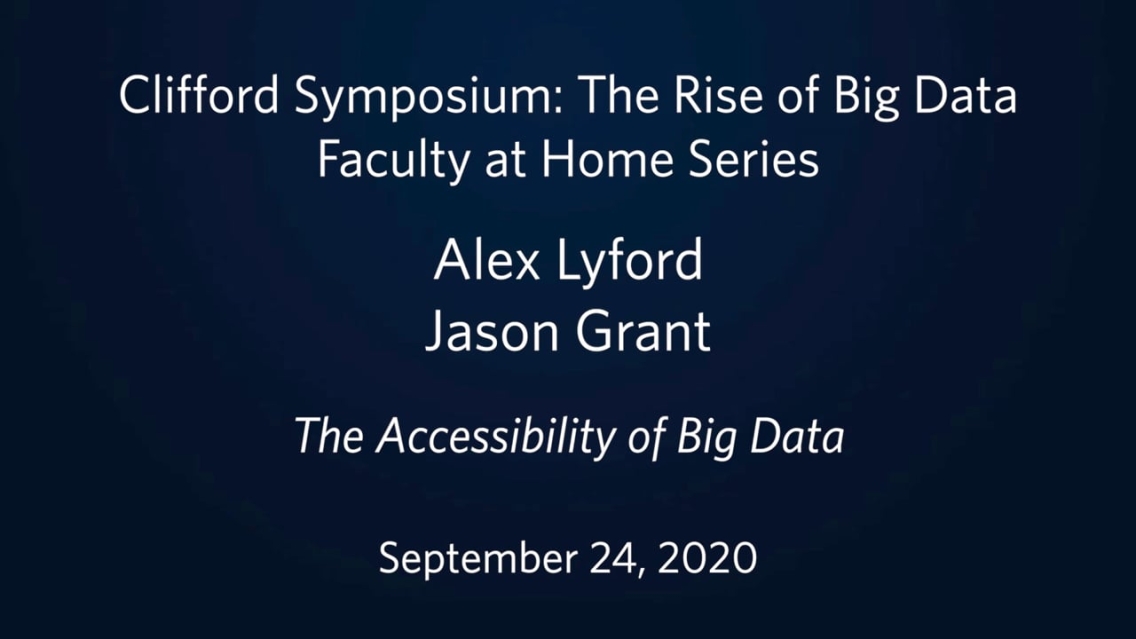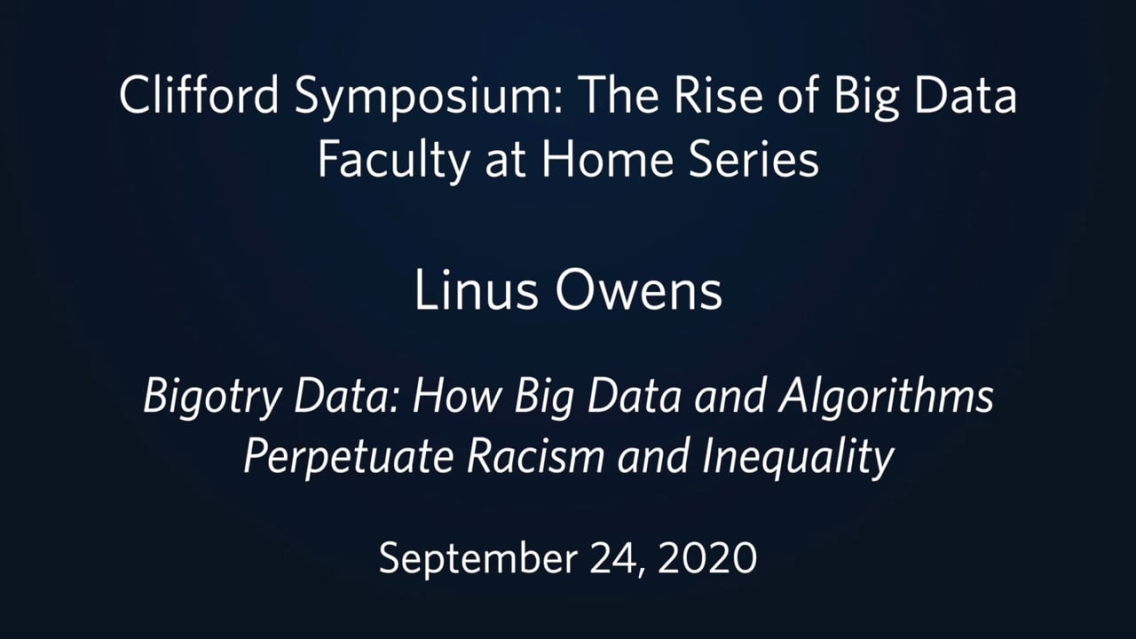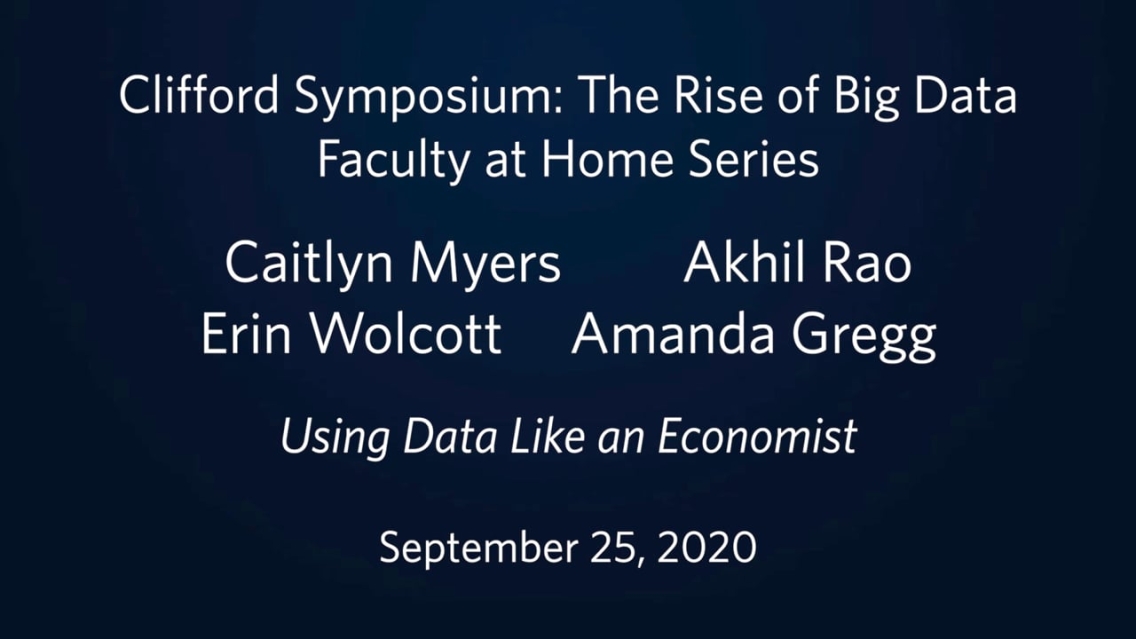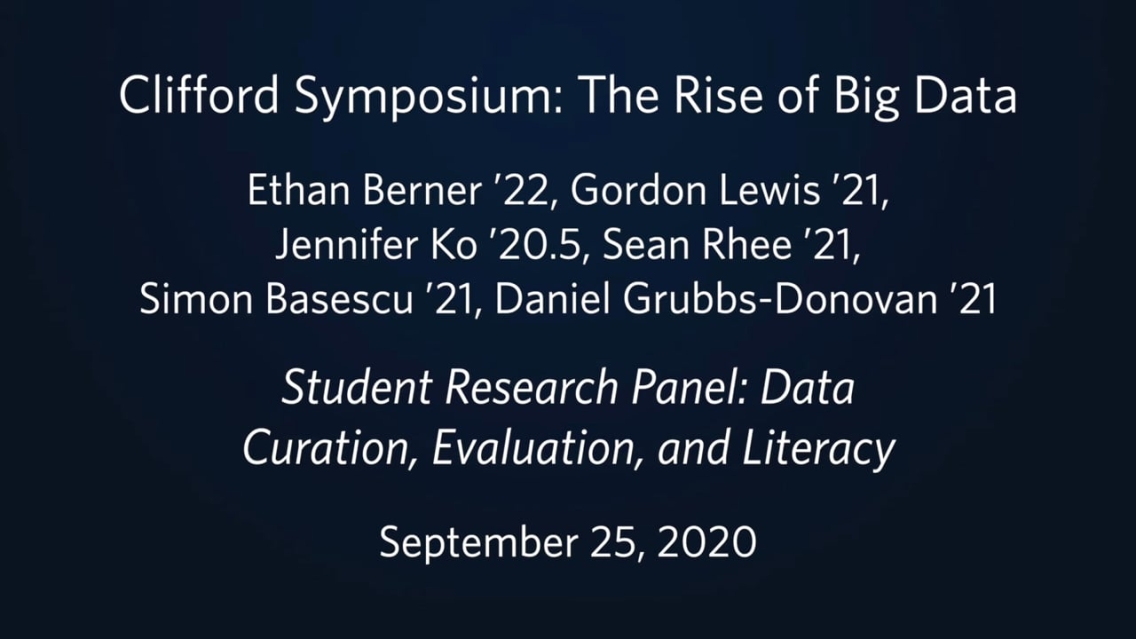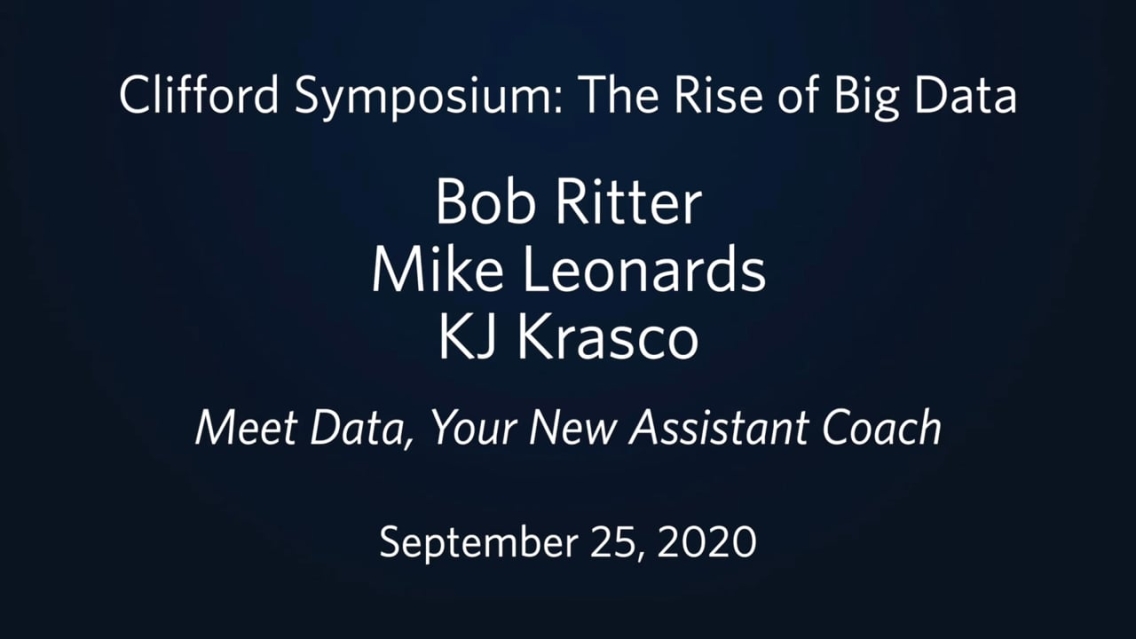2020: The Rise of Big Data

Welcome to the 2020 Clifford Symposium: The Rise of Big Data
The annual Clifford Symposium is named after College Professor Emeritus of History Nicholas R. Clifford (1930–2019), who taught history at Middlebury College from 1966 to 1993 and who, in his many years as a member of the faculty and administration, cultivated critical inquiry.
The Rise of Big Data
We talk about “Big Data”—but what does that mean?
This year’s Clifford Symposium invites you to explore the following:
- Why is Big Data so pervasive?
- Why is it so effective?
- Why is it so important to the way we live and learn at Middlebury?
- How are Middlebury students and faculty using Big Data in innovative and productive ways?
- What’s the history of Big Data, and what might the future bring?
2020 Clifford Symposium Schedule of Events
Each semester, the four professors teaching the four core courses for Environmental Studies major share their different disciplinary and interdisciplinary approaches to a common theme or question. This year, in coordination with the Clifford Symposium, we will briefly discuss different ways in which, in our work in Environmental Studies, we gather, organize, analyze, and draw conclusions from data.
Panelists:
Joseph Holler, Assistant Professor of Geography
Christopher McGrory Klyza, Stafford Professor of Public Policy, Political Science, and Environmental Studies
Marc Lapin, Associate Laboratory Professor in Environmental Studies; College Lands Ecologist
Kathryn Morse, John C. Elder Professor of Environmental Studies; Professor of History
This event will be moderated by Dan Brayton, director of the Program in Environmental Studies.
Big data are ubiquitous. Although this may not come as a surprise, you may be surprised at how easy these data are to access without any specialized technical skills! In this talk, we’ll begin by showing the power of accessing big data and the ease at which it can be done by the layperson. We’ll then discuss the pros and cons of the availability of such data and provide examples of each. Finally, we’ll talk about decision-making based on big data in facial recognition and how it will affect the future of humankind.
Panelists:
Jason Grant, Assistant Professor of Computer Science
Alex Lyford, Assistant Professor of Mathematics
This event will be moderated by Caitlin Myers, John G. McCullough Professor of Economics.
Big data seems like magic. This talk, however, urges us not to be taken in by this magical aura, but rather to look more closely at the sleights-of-hand going on behind the scenes. Specifically, this discussion seeks to expose two big misconceptions about big data. First, big data is not the exclusive realm of quantoids and coders. The role of critical social scientists, who rather than being usurped by the age of big data, are now more important than ever. They ask questions about these numbers – where they came from, what they actually measure, how they are being used, and by whom. Critical social science can also expose the flaws and dangers behind a second misconception, that big data can effectively represent objective truth. Drawing on several case studies, this talk shows how big data can misrepresent and alter the social world in ways which not only reflect existing racial biases and inequalities but also deepen them. But all is not lost! An interdisciplinary and critical data science has the potential to correct these existing racist practices and maybe even contribute to creating a more just society.
Keynote Speaker:
Linus Owens, Associate Professor of Sociology
This event will be moderated by Alex Lyford, Assistant Professor of Mathematics.
How do economists use data to answer the questions that fuel their curiosity about the social world? Join four faculty colleagues from the economics department who will present on how they collect data and use powerful and creative tools of data analysis to answer questions on topics as diverse as firms in Imperial Russia, the “burdens” of abortion restrictions, measuring unemployment in a pandemic, and allocating satellite orbital paths. This session is organized as four short individual presentations followed by a moderated Q&A with the audience.
Panelists:
Caitlin Myers, John G. McCullough Professor of Economics
Akhil Rao, Assistant Professor of Economics
Erin Wolcott, Robert A. and Ina Jones Jr. Faculty Fellow in Economics; Assistant Professor
Amanda Gregg, Assistant Professor of Economics
This event will be moderated by Jessica Holmes, professor of economics.
Calibrating a Theoretical Economic Model of Orbit Use | Ethan Berner ’22 and Gordon Lewis ’21
Ethan Berner is a junior from Vienna, Austria. He studies economics and computer science and is interested in further exploring the intersection of these fields.
Gordon Lewis is a senior from New Hampshire, pursuing a double major in economics and political science. He is interested in public policy, international relations, and global inequality. Outside of his major, he enjoys learning languages and reading fiction.
The Efficiency of San Francisco’s Bike Share System | Jennifer Ko ’20.5
Born in Seoul, South Korea, and raised in Frankfurt, Germany, Keun Young (Jennifer) Ko is a super-senior Feb, majoring in economics and minoring in mathematics. The course Intro to Data Science in spring 2019 sparked her interests in data science (visualization and machine learning) and user experience, and Jennifer has since conducted independent projects with data from industries including transportation and media and entertainment. Over the summer, Jennifer conducted market research and quantitative data analyses on a healthcare litigation case at an economics consulting firm. She hopes to continue to pursue a similar career path after graduation.
The Importance of Data Literacy | Sean Rhee ’21
Ho June (Sean) Rhee ’21 is an international student from Seoul, South Korea, majoring in economics and Spanish. His interests concentrate on decision making, development, and inequality. During his time at Middlebury, he has carried out multiple data-driven research projects. He is developing a thesis exploring the effect of media representation on xenophobia this year.
Visualizing Trends in Vermont’s Hospital Usage over Time | Simon Basescu ’21
Simon Basescu is a senior at Middlebury majoring in computer science. He is interested in the intersection of technology and the humanities and exploring how Big Data can be used to understand and improve the world. In his free time, he likes to write, play tennis, and road bike.
Dataset Curation: News Coverage of Police Shootings in the United States from 2012 to 2020 | Daniel Grubbs-Donovan ’21
Daniel Grubbs-Donovan is a senior math major from Dartmouth, Massachusetts. He is interested in Big Data and data journalism.
This event will be moderated by Alex Lyford, Assistant Professor of Mathematics and Jason Grant, Assistant Professor of Computer Science.
Panelists:
Bob Ritter, Michael G. Heinecken Head Coach of Football
Mike Leonard, Head Coach of Baseball
KJ Krasco, Head Coach of Women’s Basketball
This event will be moderated by Jason Grant, assistant professor of computer science.


